Since late August 2025, mass protests have erupted across Indonesia, Southeast Asia’s largest democracy. The protests were sparked by the discovery of lawmakers’ exorbitant housing allowances, rubbing salt in the wounds of populism and elitism in an era of scarce economic opportunities for economically vulnerable populations. Starting in Jakarta, the protests quickly spread across 32 other provinces, which resulted in violence when a delivery driver was killed by a police vehicle. Police have arrested more than 3,000 individuals and at least 10 people have died. In an accepted political move, Indonesia’s President Prabowo Subianto condemned the rioters as “treasonous” and announced the removal of the lawmakers’ housing allowances in an attempt to assuage public anger.
While these protests have visible causes, the deeper roots of dissatisfaction address Indonesia’s structural inequality. Their lives continue to worsen as everyday households are met with inflation, lost jobs, and cutbacks dealing with austerity. They interact with an elite class that have maintained or grown (with excessive benefits) their benefits while everyday households have only seen deteriorating circumstances, cuts in health and education spending, and an inconsistent roll-out welfare that was only partially funded and began sporadically in 2019, decades earlier. This has reinforced class-based resentments toward the “political elite” class
These recent events have significant geopolitical implications. Indonesia, like other countries, has been the target of extensive power plays and manipulation by regional and global powers. Being the largest economy in ASEAN, the largest multi-ethnic country in the world, and the caretaker of the Strait of Malacca for global shipping, its stability is warranted and will not go unnoticed. Global trade and energy security will certainly depend on Indonesia’s stability, resulting in other significant observable effects on regional and global policymaking priorities and relations. With a close eye on these events, China is positioning itself to assert its influence as a financial power for loans and allowing China more control over Indonesia’s nickel sector as a long-term strategy. China is prepared to move to the fore as a “stability partner” if needed.
For India, the fallout could mean supply disruptions in palm oil and coal, higher inflation, risks to maritime security, and a shrinking strategic space in Southeast Asia if Beijing deepens its influence.

